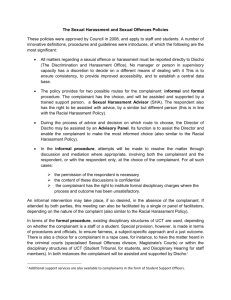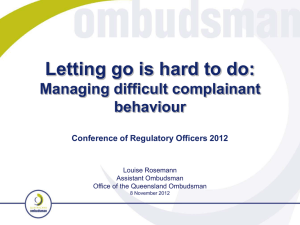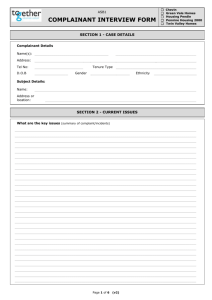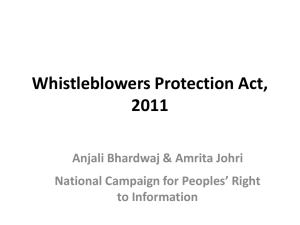view - Federal Tax Ombudsman Pakistan
advertisement
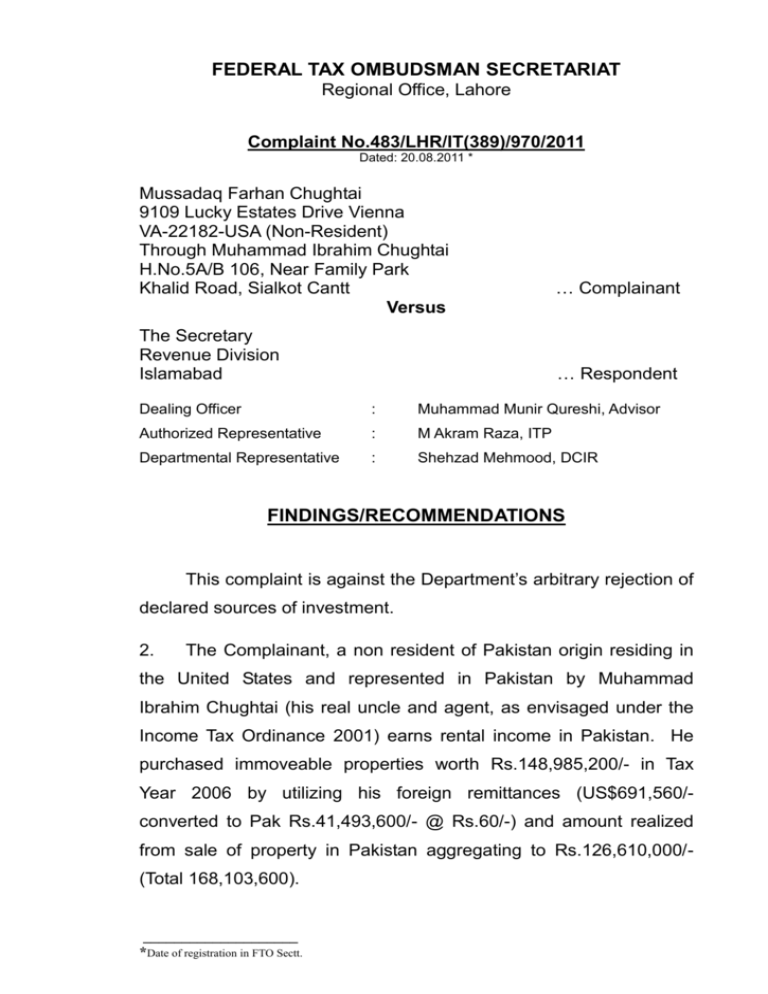
FEDERAL TAX OMBUDSMAN SECRETARIAT Regional Office, Lahore Complaint No.483/LHR/IT(389)/970/2011 Dated: 20.08.2011 * Mussadaq Farhan Chughtai 9109 Lucky Estates Drive Vienna VA-22182-USA (Non-Resident) Through Muhammad Ibrahim Chughtai H.No.5A/B 106, Near Family Park Khalid Road, Sialkot Cantt Versus The Secretary Revenue Division Islamabad … Complainant … Respondent Dealing Officer : Muhammad Munir Qureshi, Advisor Authorized Representative : M Akram Raza, ITP Departmental Representative : Shehzad Mehmood, DCIR FINDINGS/RECOMMENDATIONS This complaint is against the Department’s arbitrary rejection of declared sources of investment. 2. The Complainant, a non resident of Pakistan origin residing in the United States and represented in Pakistan by Muhammad Ibrahim Chughtai (his real uncle and agent, as envisaged under the Income Tax Ordinance 2001) earns rental income in Pakistan. He purchased immoveable properties worth Rs.148,985,200/- in Tax Year 2006 by utilizing his foreign remittances (US$691,560/converted to Pak Rs.41,493,600/- @ Rs.60/-) and amount realized from sale of property in Pakistan aggregating to Rs.126,610,000/(Total 168,103,600). ____________________ *Date of registration in FTO Sectt. 2 483/LHR/IT(389)/970/2011 3. The Deptt conducted Complainant’s tax audit for Tax Year 2006. Initially, the Department wanted to tax the gain realized by the Complainant on immoveable property sold by him, beliveing that the Complainant was a dealer in real estate in Pakistan and the gain was in the nature of business profit. However, this changed during the audit proceedings when the Complainant clarified that he derived income from rental property, not from buying/selling property in Pakistan. Deciding in principle to drop its earlier probe into the Complainant’s alleged business of real estate in Pakistan, the Deptt. started a fresh investigation into the Complainant’s sources of investment. However, the earlier proceedings were not formally brought to a close before the fresh investigation was started. 4. The audit concluded on 14.06.2011, after four years, finally concluding that the Complainant had been unable to establish that the foreign remittances were actually utilized in the purchase of immoveable property in Pakistan. As regards income from sale of property, the Deptt held that the documents (three Iqrar Namas dated 19.02.2005, 27.10.2005 and 07.06.2006) presented by the Complainant were not authentic and the sale proceeds therefrom were not established to have been actually received by the Complainant in Tax Year 2006. And so, the entire investment made by the Complainant, aggregating to Rs.148,985,200/- was treated as unexplained income and brought to tax under Section 111(1)(b) of the Income Tax Ordinance 2001, creating a tax demand of Rs.37,298,843/-. 5. According to the Complainant, the Departmental action was arbitrary, discriminatory, harsh, oppressive and bereft of any objective basis as financial resources well in excess of the investment made in acquisition of immoveable property were available with him in the 3 483/LHR/IT(389)/970/2011 relevant period when the properties were purchased. The Deptt had even verified from the Standard Chartered Bank, Chaklala SchemeIII Branch, Rawalpindi, that the foreign remittances were received in the Complainant’s Dollar Account No.05-7924038-66, and then encashed/converted into Pak Rupees. In the case of sale of property, the amounts that the purchasers were accepted by the Deptt while completing their income tax assessments. The Deptt’s rejection of the same amount in the Complainant’s hands was arbitrary, discriminatory, unreasonable and self contradictory. What the Deptt accepted as amounts paid by the purchasers to the Complainant must be accepted in the Complainant’s hands as legitimate proceeds from the sale of same property. 6. The Complainant has also raised some technical objections. He says that issuance of a Show Cause Notice prior to initiation of audit proceedings under Section 177(4) of the Ordinance was necessary as held by the Lahore High Court in Writ Petition No.4630 of 2009 (Mohsin Raza Vs Chairman FBR). Furthermore, issuance of notice was a condition precedent to amendment of the assessment under Section 122(1) read with Section 122(5) of the Ordinance. Finally, the Complainant contends that amendment made under Section 122 of the Ordinance in the case of a deemed assessment without referring to sub Section ( 5) or (5A) of Section 122 of the Ordinance was not sustainable in law, as held in 2010 PTD (Trib.) 1709 and other judgments of the Appellate Tribunal. 7. When confronted, the Deptt filed a reply in which a preliminary objection was raised that the Hon’ble Federal Tax Ombudsman did not have jurisdiction to hear and dispose of the complaint as it involved matters pertaining to assessment of income and was therefore ousted from his jurisdiction in terms of the stipulation 4 483/LHR/IT(389)/970/2011 obtaining in Section 9(2)(b) of the FTO Ordinance. It was also contended that as the Complainant in Pakistan was a non-resident a number of statutory notices were issued to Muhammad Ibrahim Chughtai, his real uncle and representative/agent in Pakistan, but these elicited no response. Not only was the response filed belatedly, but the Departmental queries were not adequately answered. 8. The Deptt contended that as many as three Iqrar Namas dated 19.02.2005, 27.10.2005, and 07.06.2006 were filed by the Complainant in respect of the same piece of land at village Bharth, Sialkot. The sale of this land the Complainant claimed had generated resources amounting to Rs.126,610,000/- between 19 February 2005 and 06 June 2006, which the Complainant then utilised to purchase various immoveable properties. 9. The Deptt has expressed reservations as to the authenticity of the Iqrar Nama’s, contending that the registered sale deeds were not properly executed. Different amounts stated to have been received in installments from the alleged sale of property were not all routed through banking channels, as some of the cheques claimed to have been received were not reflected in the bank statements. 10. As regard foreign remittances, the Deptt contends that letters were written to Standard Chartered Bank, Sialkot Branch, asking for confirmation that the US dollars received in the Complainant’s Foreign Currency Account were subsequently converted into Pak Rupees. These letters elicited a ‘vague response’ from the bank. A detailed notice under Section 122(9) of the Ordinance was therefore served on Muhammad Ibrahim Chughtai, but there was no response. A copy of the said notice was also served on the Complainant’s Tax 5 483/LHR/IT(389)/970/2011 Consultant, but it was also not complied with. According to the Deptt, Standard Chartered Bank, Sialkot Branch, vide their letter dated 01.06.2011 received in the Deptt the same day confirmed that the Complainant’s bank statement from 22.02.2005 to 30.06.2006 did not reflect any foreign remittances from the Complainant’s Foreign Currency Account maintained at Chaklala Branch, Rawalpindi. The Deptt goes on to say that in order to enable the Complainant to explain his position in the matter, another notice was issued on 07.06.2011 for 14.06.2011. Although the notice was properly served, there was again no compliance. An adverse inference was therefore drawn against the Complainant and assessment finalized under Section 122(1) of the Ordinance on 14.06.2011, rejecting the Complainant’s explanation regarding his sources of investment. 11. As regards the technical objections raised by Complainant, the Deptt contends that the apex court had held that it was not mandatory that a Show Cause Notice be issued prior to selection of a case for audit under Section 177(4)(d) of the Ordinance. Similarly, the Deptt denies that non-issuance of notice under Section 122(5) of the Ordinance was necessarily fatal to an amended assessment under Section 122(1) of the Ordinance. 12. The Complainant denies any deliberate default of statutory notices and asserts that notices served properly were responded to. A reply to the Departmental notice issued under Section 176 of the Ordinance on 02.03.2010 for compliance by 08.03.2010 was responded to by the Complainant on 24.03.2010. A detailed written reply was filed along with various documents including Complainant’s wealth reconciliation statement as on 30.06.2006, bank certificate showing receipt of foreign remittances in Complainant’s Foreign Currency Account at the Standard Chartered Bank, Chaklala Branch, 6 483/LHR/IT(389)/970/2011 Rawalpindi, and copies of ‘Iqrar Namas dated 19.02.2005, 27.10.2005 and 07.06.2006. A reply dated 08.12.2010 to queries raised in Departmental notice dated 15.11.2010 was also submitted. However, the Complainant acknowledges that due to various ailments, the Agent was unable to hand over the notices to his Tax Consultant. A medical certificate was filed to substantiate the contention. 13. The AR denies that the Complainant or his Agent received any notice from the Deptt regarding letter dated 01.06.2011 received from Standard Chartered Bank, Sialkot. Also, the Departmental reference to Standard Chartered Bank’s letter that no transfers from the Complainant’s Foreign Currency Account to his Rupee Account at the Sialkot Branch had taken place was a misreading of the letter dated 01.06.2011. What the letter meant was that no remittances received in the Complainant’s Foreign Currency Account at Rawalpindi were credited to Pak Rupee account in the period 22.02.2005 to 30.06.2006. The AR pointed out that the properties in question were actually paid for by the Complainant prior to 22.02.2005 and legal formalities completed subsequently in Tax Year 2006. As such the Bank’s cited letter had no significance at all. 14. The AR pointed out that the three letters sent by Standard Chartered Bank in response to queries made by the Deptt. were not mentioned at all in the assessment order passed under Section 122(1) dated 14.06.2011. It was a conspicuous omission by the assessing officer. The AR contends that the omission was deliberate as the contents of the letters supported the Complainant’s viewpoint and not the Deptt’s. 7 483/LHR/IT(389)/970/2011 15. The AR further stated that under the law, investment in Pakistan required that foreign exchange be remitted to Pakistan from abroad, the proceeds be converted into Pak Rupees by a scheduled bank, and a certificate of encashment issued. All three requirements were fully satisfied in the Complainant’s case and there was therefore no cause to draw an adverse inference in the matter. 16. Finally, the Complainant states that the fact that the amendment order was passed under Section 122(1) and not under Section 121 (exparte) of the Ordinance, establishes that the Complainant had cooperated with the Deptt. However, the Deptt misread much of the evidence filed by the Complainant and drew wrong conclusions and illegally prolonged the assessment proceedings with ulterior motives. 17. The preliminary Departmental objection has been considered. The objection raised is found to be misconceived as the specific allegation against the Deptt by the Complainant was not the quantum of Income assessed per se, but that the Deptt had arbitrarily and in a discriminatory manner disregarded the Complainant’s documentary evidence and explanation regarding his sources of investment. The alleged procedural injustice being well within the Hon’ble FTO’s jurisdiction does not fall within the purview of Section 9(2)(b) of the FTO Ordinance. 18. The Departmental rejection of Complainant’s sources of investment is based on the premise: (a) that the actual withdrawal of Pak Rupees from the Complainant’s Rupee account maintained in the Standard Chartered Bank, Sialkot, was not established, and (b) that the receipt of sale proceeds, in installments, from sale of Complainant’s 57 Kanals plot in village Bharth, Sialkot, was not 8 483/LHR/IT(389)/970/2011 proved. The Deptt appears to be of the view that the sale proceeds were received in their entirety on 07.06.2006 when the third and final Iqrar Nama was executed. That being so, the amount received in its entirety on 07.06.2006 could not have been used to finance the purchase of properties by the Complainant in the prior period. 19. Examination of the record shows that foreign remittances were sent by the Complainant (from the U.S.A where he was resident since 1981 and derived income from business) to his Foreign Currency Account in the Chaklala Branch of Standard Chartered Bank. Itemized details of deposits and withdrawals relevant to the Foreign Currency Account are reflected in a bank statement filed by the Complainant. The foreign remittances were later encashed and converted to Rs.41,493,600/- between 23.10.2001 to 22.09.2005 for utilization in the purchase of immoveable property. Once the U.S. Dollars were converted into Pak Rupees it was up to the Complainant how he used them. He could keep the amount with himself in as cash in hand or he could deposit the proceeds in a Pak Rupee account either totally, or partially and keep the balance amount with him as cash. He could invest the converted U.S. Dollars in any manner that he deemed fit, including purchase of immoveable property (2006 PTD 2828) and there was no requirement in law that he should first deposit the proceeds in a Rupee Account and then withdraw the amount therefrom and produce a Bank Statement of the Rupee Account in order that the source of his investment be accepted by the income tax authorities. 20. So far as the sale proceeds realized by the Complainant from sale of 57 Kanals and 11 Marlas land in village Bharth, Sialkot, are concerned, the Complainant has explained that payment was received by him in installments, through bearer cheque, crossed 9 483/LHR/IT(389)/970/2011 cheque and cash between 19.02.2005 and 07.06.2006. The three Iqrar Namas were executed in this period, on 19.02.2005, 27.10.2005 and 07.06.2006. In the case of payment received through bearer cheque, the same was received by the Complainant at the bank counter and the cheque was not deposited in his bank account. It was therefore not reflected in his Bank Statement. The Deptt has questioned the authenticity of the Iqrar Namas without citing any convincing reasons. An Iqrar Nama or agreement to sell is an established legal way of entering into a transaction involving immoveable property and the Deptt has not established that the requirements of law and procedure that needed to be fulfilled in this regard were not fulfilled by the Complainant in any of the three Iqrar Namas executed between the Complainant and the buyers of his property in village Bharth, Sialkot. Examination of the relevant record, including the Bank Statement for the Sialkot Branch of Standard Chartered Bank A/c No:01-6265316-01, confirms that the cheque payments received between 08.09.2005 and 15.02.2006 aggregating to Rs.52,887,000/- for sale of Complainant’s 57 Kanals 11 Marlas land at village Bharath, Sialkot, as per the 2nd Iqrar Nama dated 27.10.2005 were duly credited in that account. An amount of Rs.5,000,000/- was received separately in cash. As regards the first and third Iqrar Nama, the payment of Rs.30,000,000/- and Rs.38,723,000/- respectively, is shown to have been received in cash. The total amount received in cash and through cheques for the village Bharth land, thus comes to Rs.126,610,000/21. Having examined the evidence placed by both sides in support of their respective points of view, it is evident that (i) the Deptt had no clear idea of what it intended to do during Audit in the Complainant’s case. Audit proceedings were 10 483/LHR/IT(389)/970/2011 started on the premise that the Complainant was a dealer in real estate in Pakistan and the differential between purchase price and sale price in the case of properties sold out by him was liable to be taxed as the Complainant’s business income. Further, the sources of investment required to finance the purchase of the cited properties also needed to be probed. However, during the course of the audit, the Deptt shifted its stance and held that the Complainant had no legitimate resources to finance the purchase of properties. When the Deptt decided to conduct audit on different lines than what was conveyed to the Complainant initially, the earlier proceedings should have been first concluded and then a fresh notice issued for the conduct of audit to investigate the Complainant’s sources of investment only. Failure to do so betrays professional incompetence; (ii) the Deptt. did not make any mention of the three letters dated 26 June 2008, 13 May 2011 and 01 June 2011 that it received from the Standard Chartered Bank. This indicates that available evidence was suppressed. As the cited letters lent support to the Complainant’s contention, such selective treatment of relevant evidence shows a predetermined intention to make out a case of unexplained investment against the Complainant; (iii) the Departmental did not confront the Complainant with their ‘finding’ that no encashed US Dollar receipts from the Complainant’s Foreign Currency Account were credited to the Pak Rupee account. Proper opportunity, as envisaged in law, was thus not accorded to the Complainant to rebut the Departmental ‘finding’; 11 483/LHR/IT(389)/970/2011 (iv) the protracted audit proceedings that commenced on 29.06.2007 concluded on 14.06.2011. Assessment proceedings are required by law to be completed within a ‘reasonable time.’ In CBR Circular instructions C.No.7(2)Dt-14/94 dated 24.01.1994, it has been directed that assessment proceedings be finalized within a reasonable time, preferably within three hearings and not more than three notices be issued. The proceedings cannot be allowed to be spread out over years with a gap of almost a full year during which time only a single notice was issued by the Deptt. To keep the taxpayer guessing as to his fate in the audit with no closure in sight is tantamount to maladministration under Section 2(3)(iii) of the FTO Ordinance. The Appellate Tribunal in judgment cited as 2010 PTD 1489 has emphasized that protracted delay in bringing judicial proceedings to a close within a reasonable time would render them null and void in the eye of law; (v) the repetitive issuance of as many as 20 statutory notices was tantamount to maladministration under Section 2(3)(iii) of the FTO Ordinance; (vi) the finalization of audit, after repeatedly observing in the assessment order that the Complainant had not complied with the terms of statutory notices issued and served properly on the Complainant’s agent, required assessment under Section 121 of the Ordinance (exparte), not under Section 122(1). It contradicts the assessing officer’s assertion that the Complainant did not comply with statutory notices issued and properly served on the Complainant’s agent in Pakistan; 12 483/LHR/IT(389)/970/2011 (vii) a deemed assessment having been made under Section 120(1) of the Ordinance initially, the subsequent amendment under Section 122(5) required that a show cause notice be served so as to accord opportunity to the Complainant, as envisaged in law, to properly explain his position. The Deptt’s lapse in this regard was tantamount to maladministration under Section 2(3) of the FTO Ordinance, 2000. The Income Tax Appellate Tribunal in judgment cited as 2010 PTD 1709, has held that once audit proceedings were initiated under Section 177 of the Ordinance and amendment was required to be made under Section 122(5), assumption of jurisdiction under Section 122(5) was a condition precedent to amendment; (viii) the Department rejected all three Iqrar Namas filed by the Complainant to substantiate sale of his property at village Bharth, Sialkot. However, in assessments made earlier in the case of the buyers of these properties, the Deptt had raised no objection with regard to the authenticity of any of the three Iqrar Namas submitted, which was evidently arbitrary. A contrary view taken in the Complainant’s case, when the property, the buyers of the property and the seller (that is, the Complainant) are the same, was indeed discriminatory. The Deptt. cannot approbate and reprobate in the same breath; (ix) the Department failed to ascertain what other sources of income the Complainant had invoked to be able to purchase property worth Rs.148,985,200/-. After the Deptt had arbitrarily rejected the declared sources of investment of the Complainant that were fully documented, such a failure shows gross professional incompetence; and 13 483/LHR/IT(389)/970/2011 (x) the Deptt. violated the CBR Circular instructions contained in C.No.1(14)E&02/95-P dated 12.04.2011, directing that foreign remittances encashed in Pak Rupees and utilized to finance expenditures were not to be subjected to unnecessary probe. Findings: 22. The multiple instances of maladministration as detailed above are established. Recommendations: 23. FBR to direct the Commissioner to – (i) invoke his revisionary jurisdiction under Section 122A of the Ordinance to set aside the order passed under Section 122(1) of the Ordinance, and proceed as per law; and (ii) report compliance within 30 days. (Dr. Muhammad Shoaib Suddle) Federal Tax Ombudsman Dated: 16-XII-2011 mmq/my

